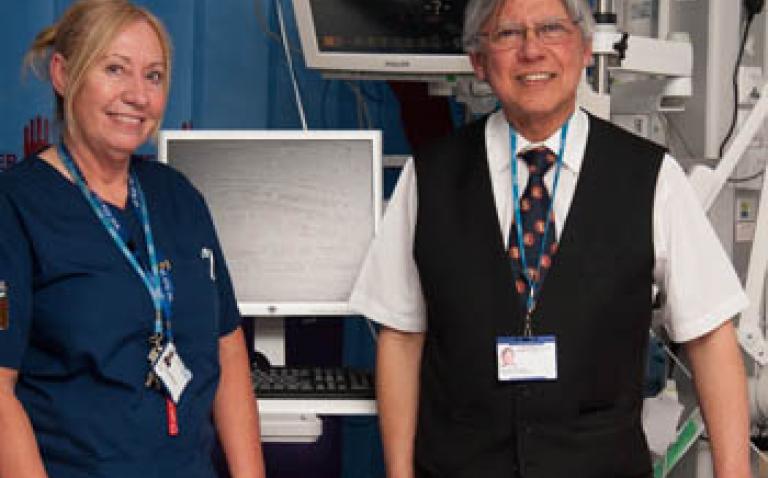A new electronic clinical information system that promises to reduce errors and enhance patient care in critical settings has been installed at Royal Albert Edward Infirmary in Wigan.
The Intensive Care Unit (ICU) and Coronary Care Unit (CCU) for Wrightington, Wigan and Leigh NHS Foundation Trust have moved towards its vision of an integrated paperless Trust with the installation of the latest Philips IntelliSpace Critical Care and Anaesthesia system (ICCA).
Clinical leads have been working on the project for the last year, ensuring that the ICCA is configured to exactly what the teams in CCU and ICU require, and the ICCA went live in spring of 2014. The transformation in each high acuity unit was achieved in just a few hours as staff moved from bed to bed, powering up each bedside system and transcribing the patient’s final paper notes.
The ICCA already is being used to centralise and organise admissions documents, vital signs, labs and consultation notes, as well as providing high quality data for audits and reports. Advanced decision support is embedded and the system could also be used for ordering medication.
The project was championed by consultant cardiologist Dr Nayyar Naqvi, founder of the Heart Beat Appeal that supported purchase of the system in Coronary Care with a £93,000 contribution. IM&T Capital Investment funded the complementary set-up in ICU.
Dr Naqvi said: “We are all delighted with the new Philips system. Nurses and doctors are not spending their time filling in forms and have more time for clinical work. My consultant colleagues can look up the patient on their own computer and everything they need to know is there. Things are much more streamlined. During ward round you just click a button and you can see the electrocardiograms and angiograms on-screen. It means the continuity of care is enhanced. It’s a great innovation and I am pleased that we are now using 21st-century technology.”
Clinical Lead Petro Bekker, a senior sister on ITU seconded to the project, explained, “The Philips’ package is very configurable to our documents and the way we work as a Trust. We can configure ICCA to do exactly what we want. There is a log of events and you have to put in your username and password to enter anything. It includes what interventions are done and when. But you can’t do anything without using your digital signature so the ICCA improves safety and reduces the risk of error.”
She added, “People are still getting used to the system but they can see it’s beneficial in saving time already. You can see a patient status overview on one page, a 24-hour view or break down per hour. There is less paperwork and more time for care. Nurses are also contributing to the system’s development. It has been configured to our liking and nothing is fixed. We are even thinking differently about how the shift gets planned now.”
The relationship that the Trust’s team in Wigan has with Philips has been crucial to the project’s success, according to Clinical Systems Project Manager, Tom Richens. He said: “It was very important for us to have reassurance of 24/7 support from Philips and the installation went without a hitch. Our staff also felt more confident because the Philips applications specialist had a clinical background. That sort of thing makes a big difference.“
He added: “Phillips pulled out all the stops for us. We knew we could pick up the phone at any time and they would be happy to answer any of our questions. There is still a feeling that we are in it together, even now. The support is still there.”
The next step for the teams on ICU and CCU is to establish an internal user group to gather ideas for configuration changes. Consultant anaesthetist Dr Rafat Saad is keen to test out the quality of data he will need to write coroner’s reports. “I am pleased with the ICCA’s ease of use,” he said. “It’s not a one size fits all package and we can manipulate the system and build it up to be exactly what we want.”
Healthcare staff demonstrated the benefits of the Philips ICCA to the Trust’s Chief Executive Officer Andrew Foster and Chairman Les Higgins, during a tour of both units. Mr. Foster described it as ‘very impressive,’ and congratulated the teams on ‘an excellent collaboration.’










